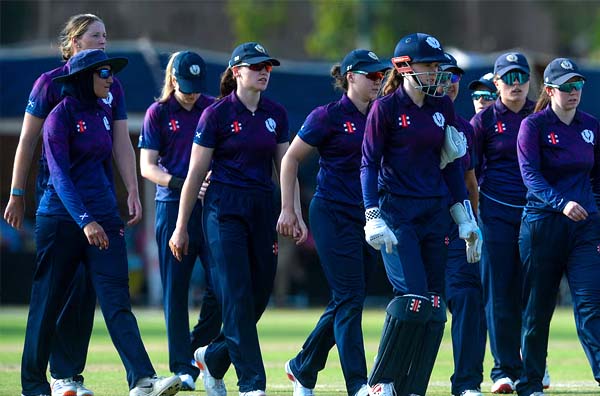Just months after making history with their first-time appearance at the ICC Women’s T20 World Cup Qualifier, the Scotland women’s cricket team finds themselves in an unexpected position with no international fixtures scheduled for the remainder of 2025.

Despite a breakthrough this season, that included an inch closer to the ICC Women’s World Cup but narrowly missing following a one wicket defeat against Ireland, the team faces an uncertain future with no matches on the horizon and limited resources to make a change.
“From a funding perspective, cricket costs so much to run. Our resources are extremely sparse – we’re almost running on fumes to try and have our women’s programme exist,” said director of performance Steve Snell.
Scotland’s journey over the years was a culmination of steady progress. Led by captain Kathryn Bryce, the team went very close against Ireland to close their ticket for the qualification but missed out on a single wicket. Although they exited in the group stage, their experience was transformative and secured their maiden berth at the global tournament.
One of the key reasons lies in the financial and structural disparities between Full Member and Associate Member nations. The cricket council of Scotland receives approximately £1.3 million annually from the International Cricket Council (ICC) to fund all its programs, including men’s and women’s cricket. Comparatively, the England and Wales Cricket Board (ECB) receives over £30 million, allowing for a robust schedule and development programs. However, with existing financial constraints the Scotland Board never reported a profit.
Wicketkeeper Sarah Bryce was crestfallen with this situation, as other teams are wanting to play with Scotland, but are unable to do so. She expressed her frustration on how the team keeps moving forward but with no opportunities on the horizon to develop. Abtaha Maqsood agrees on feeling helpless about this situation and condemns ICC for not providing a hand.
“Teams are wanting to play us now, which is really exciting, but we’re not able to. It’s just really frustrating because it’s difficult to know how we keep pushing forward as a team when we don’t have those opportunities to develop,” shared Sarah Bryce.
The situation has prompted calls for greater support from fellow cricketing bodies and Full Member Nations. The ECB emphasized its efforts, stating that it remains committed to aiding the growth of women’s cricket in Scotland. They pointed out initiatives such as including Scotland Women’s Under-19 team in the School Games last year and scheduling matches this summer between England Women’s Under-19 team and Scotland A.
For Kathryn Bryce and her teammates, the push to grow women’s cricket is not merely a philanthropic cause, it represents a practical strategy for globalizing and enriching the sport. The dominance of a few nations like India, Australia, and England, while impressive, often limits the excitement of international competitions. A more diverse and competitive field at events like the World Cup would elevate the entire sport, offering fans thrilling, unpredictable contests rather than predictable outcomes.
However, structural issues continue to hinder the vision of the team. Players in the Scotland Women’s team are frequently informed about international commitments at the last minute, many of whom are on minimal one-day-per-week contracts. The lack of clarity severely restricts the team’s ability to prepare effectively both logistically and tactically. Even in the lead-up to the Women’s World Cup Qualifier in Pakistan, the team received scant details about the tournament until just a few weeks before departure.
Coach Craig Wallace emphasized the urgency of the situation, “We need to find a way organizationally, or more likely with external help, to get some fixtures, because other countries are going to keep improving so we need to do the same to stay with them.”
The Scotland Women’s team have demonstrated resilience and potential with achieving milestones in their maiden shows. Their current situation underscores the need for systemic change to support emerging teams in this sport. As the cricketing world continues to evolve, it should be more about fairness and global growth of the sport.
(Quotes and inputs sourced from BBC)
